#star trek discovery fan fiction
Explore tagged Tumblr posts
Text
Dead Dad
New fic drop BABY!!!
https://archiveofourown.org/works/63568108
It doesn't want to add the link properly :(
Anyways:
Tilly moved again and talks to her dead dad about it.
#adiraofthetals#star trek#star trek discovery#sylvia tilly#tilly#my fic#my fanfiction#fanficton#fan fiction#fanfic#fanfiction#ao3#ao3 link#ao3 fic#ao3 fanfic#archive of our own
3 notes
·
View notes
Text
💛💙SPIRK FIC REC💙💛
Ok guys, this my favourite EVER Spirk fic, so be kind lol. It’s a SNW era fic where Kirk comes to spend a 6 month rotation on the Enterprise. It’s a beautiful story, with a fantastic plot and some exceptionally good dialogue. It’s got mystery and action and funny moments and it’s an utter joy to read! I hope you all enjoy it as much as I have 🥰
#star trek#spirk#k/s#kirk/spock#spock#k/s fanfic#fan fiction#fanfic#fan fic rec#star trek snw#james t kirk#star trek discovery#snw spirk
26 notes
·
View notes
Text
Me reading anything anyone has written about Airiam. Also people commenting about what I write about Airiam 🙃
When a fic doesn’t fit my head canons but it’s well-written

#fan fiction#fanfic#fanfiction#ao3#ao3 writer#ao3 fanfic#archive of our own#writers on ao3#writers on tumblr#Star trek#star trek discovery#star trek: discovery#airiam#can somebody else please write something about her or at least tag a Tumblr post with her so they're not ALL mine
106K notes
·
View notes
Text
This is a pretty good fic, it was a lot sweeter than I was expecting. Paul's personality matches the show.
"testy butch ass mood" sums up a lot of Paul, especially when people mess with his work
I'm not sure if they get any more back story, I'm only in season 3, I can see this being how they grew up and then met
I haven't read any of their others but I might
I can find their account here, or else I would tag them
1 note
·
View note
Text
So there's this thread on the Star Trek subreddit asking everyone what exactly they don't like about Discovery, and, inevitably, most of the answers are pretty bland, surface-level whining about "people crying" or whatever (something that famously has never happened before on Star Trek)
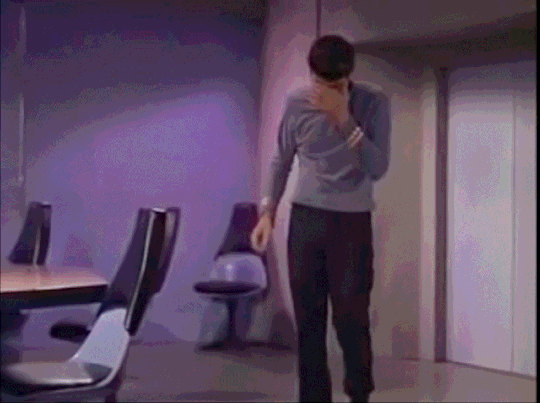
(He's just rubbing his eyes, don't mind him)
But I actually wanted to get into the weeds of it a fair amount, and so I wrote a post that became way longer than I anticipated. So below (specifying first that I don't actually hate it by any means), here's my in-depth critique of Discovery as a science fiction writer and fan:
Basically issue is this: much has been written about how Star Trek is a utopian future, a positive vision for humanity and yada yada yada…and all of these things are true. And in fact, I believe that Discovery—after its first season, at least—fits into this tradition. And I’m glad that this is true of Star Trek; I wouldn’t like it half as much if it were like, say, Babylon 5, or Battlestar Galactica.
But.
Star Trek is also fundamentally a science fiction story. And more to the point, it’s a specific kind of science fiction story: it’s science fiction in the vein of Isaac Asimov. When it works, a good Star Trek story—like a good Asimov story—works as a sort of a mystery or riddle or logic puzzle. Our heroes are faced with some problem, and we, the audience, are given clues to the solution. And if we, and the heroes, are clever, our perspective on the problem shifts and there’s this beautiful Aha! moment when suddenly everything falls into place.
Why is the Horta killing those miners? It’s a mother protecting her young.
Why does everyone keep disappearing on Beverly? The don’t; she’s the one who disappeared, all of this is a false reality, and her friends are trying desperately to save her.
How are they going to bring the Romulans into the war? By making it look like the Dominion murdered their senator.
Now, not all Star Treks (nor all Asimov stories, honestly) fit into this mould. Sometimes the problem is poorly set up; sometimes the solution doesn’t really make sense. Too often, they’re just technobabble problems with technobabble solutions and you’re just left wondering why anyone should care. And indeed, some of the very best Star Trek episodes have an entirely different structure. Like I think that “Living Witness” is honestly the best Star Trek story ever told, and it doesn’t even try to fit into the mould. Nor does “Family”. Nor does “Bar Association” or any number of my other favourite episodes. But I still think that this is the baseline Star Trek plot: clever people in space encountering problems—whether scientific, diplomatic, political, engineering, or moral—and solving them by being clever.
This applies, by the way, even when it’s not really the main thrust of the episode. Like in the latest season of Prodigy, there’s this episode where the gang are taken prisoner by the Vau N’Akat, and Jankom has his prosthetic hand confiscated by them. How do they get out? Jankom reprograms a tricorder and hacks his own prosthetic hand! It’s a minor plot point but it’s clever and it’s fun to watch, because it plays fair with what we’ve established about the universe and the characters and how technology works here.
So then. Getting back to Discovery, my issue, straightforwardly, is that I doesn’t really have this plot structure. I mean, it does sometimes—I think that the solution to “Magic to Make the Sanest Man Go Mad” is very Asimovian, and I can see how the outline of it in the resolution to the Klingon War, though I don’t think they really sold the solution. But it seems more or less absent after season one. I can’t think of a single moment in the last four seasons (and maybe this would change if I watched them again, but that won’t be for another few years at least) where I could point at the screen and say: “Aha! That was clever!”
It’s not that it’s dumb writing, by the way! Often times, particularly in season 4, the scriptwriters go out of their way to show their work (or, well…Dr. Erin Macdonald’s work, let’s be honest) to render their scripts scientifically plausible. But they feel somehow…paint by numbers.
Like, I liked season 4! It was my favourite! I think that the 10C were a cool concept and that the episode where they communicate with them was the best in the series. But did anyone ever seriously doubt how it would play out? The 10C didn’t know they were hurting people; we talk to them; we work out a mutually beneficial compromise. For Star Trek, that’s pretty much a stock plot; except here, it last 13 episodes. Or “Whistlespeak”; Michael and Tilly beam down to this jungle planet, participate in a ritual race…is there any chance that this won’t end in human sacrifice? Again, it’s competently executed, but it’s nothing new; nothing clever; nothing that makes me point at the screen and say “Aha!” The entire final season was a scavenger hunt literally based on solving riddles, and none of these riddles really rose above an escape room level. And what’s worse, none of these riddles really required elements that had been introduced beforehand. It never really felt like they were playing fair with us.
And ultimately, I think that all of this is a manifestation of the big, overwhelming problem with Discovery: everything—plot, character, worldbuilding—is driven entirely by theme. “We want to do a season on xenophobia / authoritarianism / COVID anxiety / etc.” Okay, well then this, this, and this need to happen, this character needs to act this way because they represent this, and then this needs to happen to convey this message. There’s no roomfor the story or characters to evolve organically; there’s no room for play. And that’s what this kind of cleverness is: it’s play. It’s the writers picking up the pieces that they’ve laid out and finding clever ways to use them. It’s the writers having fun. And if the writers are having fun, then the show is fun, and the audience is having fun! But if you just pick a theme and subordinate the logic of character, plot, and world to advancing this theme, it just becomes a sort of dour ritualistic pantomime, even when fun is had on screen.
Anyways, that’s my take.
52 notes
·
View notes
Text
LGBTQ+ Disabled Characters Showdown Round 4, Wave 1, Poll 5


A character being totally canon LGBTQ+ and disabled was not required to be in this competition. Please check qualifications and propaganda before asking why a character is included.
Check out the other polls in this wave and round here.
Tougou Mimori-Yuuki Yuuna is a Hero
Qualifications:
her legs are paralyzed for a long time and even after she regains leg movement she still likely has some form of ptsd due to her experiences (she also clearly shows signs of some other kind of mental illness but that isn't explicitly stated by canon), she also canonically has a crush on her best friend and has an extremely homoerotic relationship with her other best friend
She is canonically sapphic and a wheelchair user.
Propaganda:
she's so amazing, like she's the mom friend, the tech wiz, she pretended to be a vigilante one time, she tried to destroy the world, she's a history buff, she's stubborn, she had amnesia, she prefers her last name even with her closest friends, she's a total goofball, she loves to cook and bribes her friends with snacks
Are you a fan of magical girls? Of magical girls who would like to kiss other magical girls, perhaps? Well then. #togosweep
The qualifications and propaganda paragraphs correspond, @melodemonica is the first submitter.
S’chn T’gai Spock-Star Trek
Qualifications:
He is canonically dyslexic, and commonly interpreted as autistic. I do not think I have to tell you why I think he qualifies as LGBTQ+.
Propaganda:
He started it all! Spirk was the birth of slash fiction and fandom itself. Autistic, dyslexic, gay-- what can't he do?
Anything Else?:
THIS APPLIES ONLY TO THE ORIGINAL SERIES VERSION OF SPOCK. NOT THE SPOCK FROM THE JJ ABRAMS MOVIES OR THE NEW ITERATION OF SPOCK FROM STRANGE NEW WORLDS. Discovery Spock does count as TOS Spock in my mind, though. AOS & SNW Spock are some of the least gay characters I have ever seen, and it is quite sad.
Submitted by @convenient-plot-device
Check out some additional propaganda for Spock here and also here.
#polls#poll#disability#disabled characters#lgbtq#lgbtq characters#id in alt text#lgbtq dcs round 4#lgbtq dcs r4 wave 1#togo mimori#yuuki yuuna is a hero#s’chn t’gai spock#spock#star trek tos#star trek
29 notes
·
View notes
Text
Why does no one seem to remember that ALL the ships in Star Trek are AI?
Heck, the Enterprise D made a BABY, ffs!
And Voyager used neuro gel packs!
And, come on, Discovery????
Y'all. Really.
Also, can we stop blaming the technology for human f--kery?
K. Thx. Bai.
'the ultimate computer' aka uncannily precise vision of the future in which starfleet wants to replace jim with ai but spock and bones are not having it






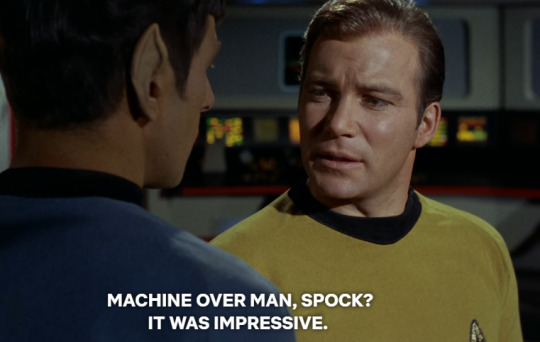


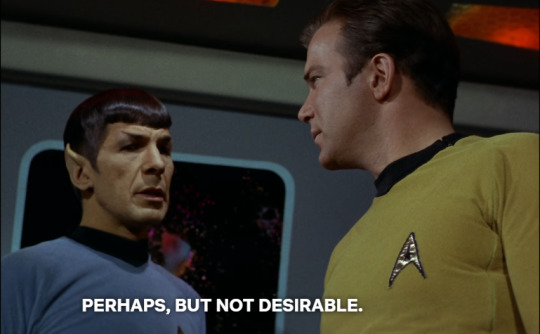





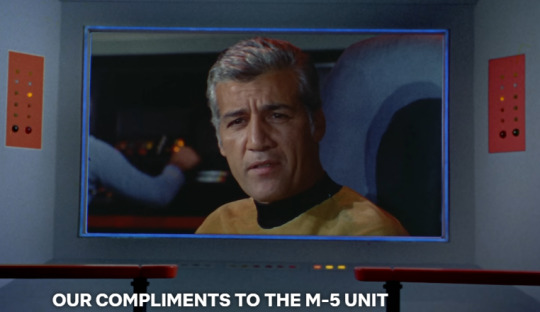

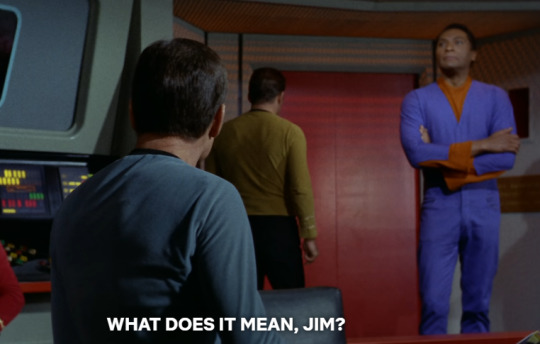






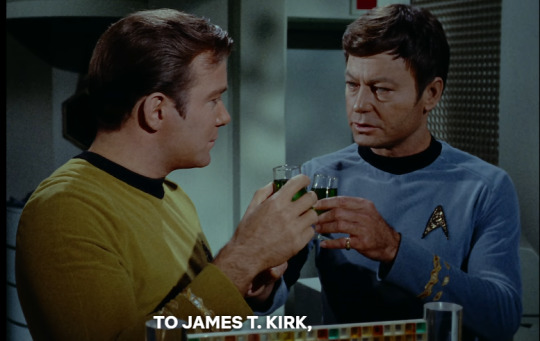


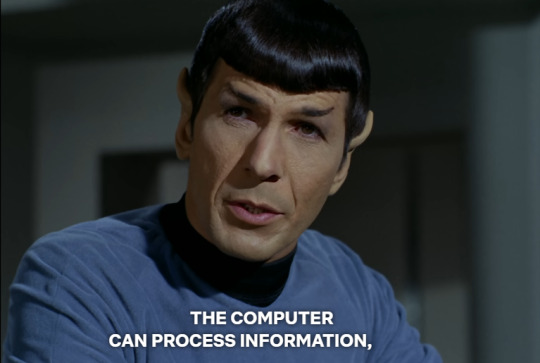

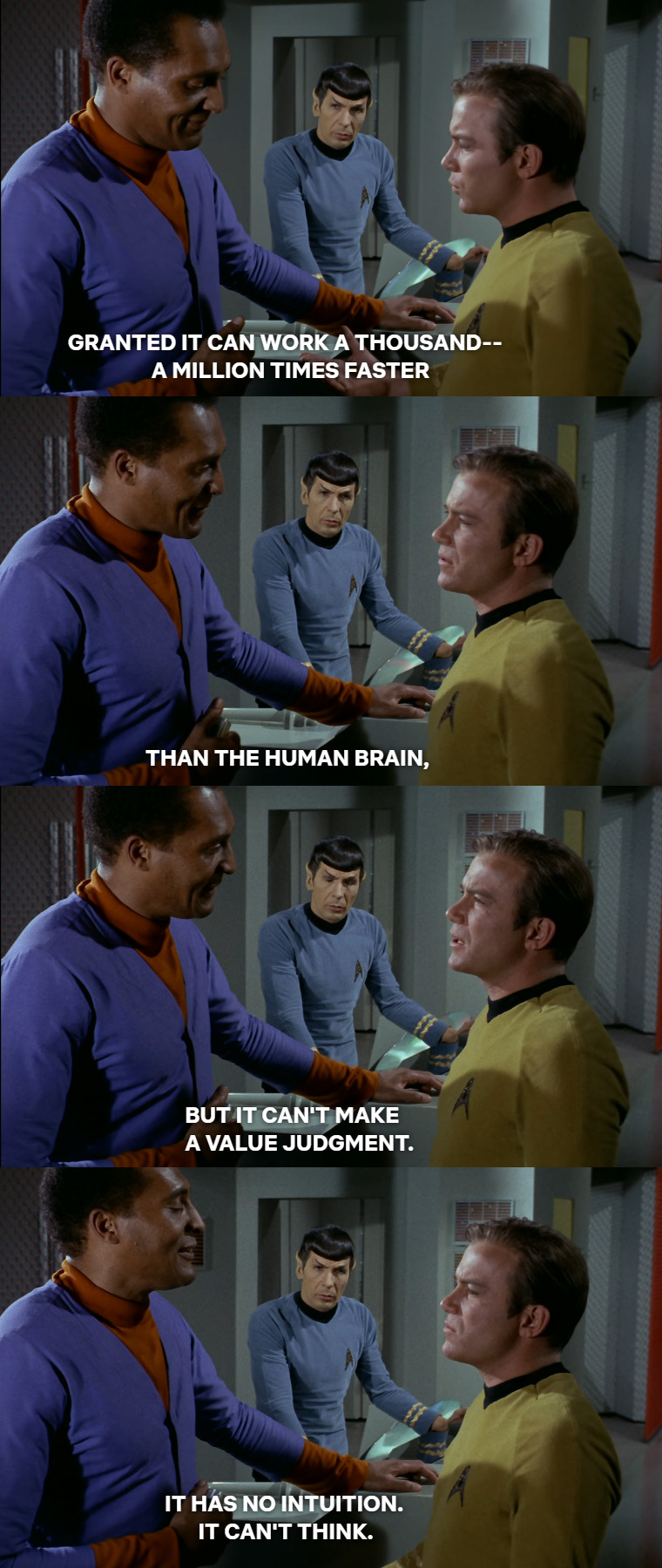
I am going feral at all the times ai is being a menace in this show and how accurate it is to the bs present we're living in
#star trek#star trek discovery#ST:TOS#star trek the next generation#star trek voyager#stop blaming tech for human fuckery#all the ships in star trek are AI#and y'all seem to think that's ok#but god forbid someone uses AI to edit their novel or something#AI is only as good as those who teach it#don't you remember the trial ep with Data?#le sigh#it's also sad when scifi fans and authors totally dismiss AI but accept it in fiction#I mean we're suppose to dream of the future not hinder it
13K notes
·
View notes
Text
By: Joshua Tyler
Published: Dec 21, 2024
Star Trek: Lower Decks had its big finale this week, and in the process of ending the show, they fixed one of the worst problems Star Trek has ever had. That problem is named Star Trek: Discovery, and thankfully, it is no longer part of the official, prime timeline Star Trek canon.
Lower Decks has always taken full advantage of its animated format to fix some of the franchise’s nagging questions and biggest mistakes. They’ve smoothed a lot of things over, but the one thing that seemed impossible to smooth over was the way Star Trek: Discovery trashed the entire Star Trek universe.
The Damage Discovery Did To Star Trek
For those who’ve forgotten, when Star Trek: Discovery first debuted, the show existed in the past for the first couple of seasons. It took place in a time between Archer’s Enterprise and Kirk’s Enterprise and began by starting a war with the Klingons.
The problem is they made the Klingons look like this…

[ Star Trek: Discovery’s Klingons ]
And in all the rest of Star Trek, since the days of the original series and limited makeup, Klingons look like this…

[ Klingons as they are in the rest of Star Trek ]
That was just the start of the mess Discovery tried to make of the Trek universe. The show was made with the goal of erasing all Trek that had gone before, and it set out to do that pretty quickly.
By season two, however, the people at Paramount realized this was a horrible idea and not what anyone wanted. So, they came up with an excuse to send the show so far into the future that it couldn’t do any more damage.
By then, they’d already done a lot. Luckily, now it doesn’t matter because the Star Trek: Lower Decks finale confirmed that the events of Discovery take place in an alternate reality.
How Star Trek: Lower Decks Removed Discovery From Canon

Paramount has been clear since the show started that, though it’s animated, Star Trek: Lower Decks is full canon and takes place in the prime timeline of the Star Trek universe. So, what happens in Lower Decks isn’t fan fiction or an alternate universe.
In the show’s finale, a group of Klingon ships encounters a phenomenon that transforms things into alternate-reality versions of themselves. When a Klingon ship hits one of those transformation rays, it transforms into a big, ugly Discovery-style Klingon ship.

[ A Klingon ship after being transformed by the multiverse ]
Then one of the crewmembers transforms into a Discovery-style Klingon.


[ Star Trek: Lower Decks transforms a Klingon into a multiverse version ]
This couldn’t have happened if those weird Discovery Klingons had ever existed in the prime Star Trek timeline. It means that Discovery and its Klingons, just like the J.J. Abrams Star Trek movies, happened in an alternate universe. One that has nothing to do with the rest of Star Trek.
Strange New Worlds Is Still Prime Timeline

You might be wondering if this means Star Trek: Strange New Worlds also exists in that same universe since the series was a spinoff of Discovery. Luckily, the answer is absolutely not.
The only Klingons we ever see in Strange New Worlds look exactly like the Klingons we’re used to seeing since Worf stepped onto the bridge of The Next Generation. There’s never been any solid explanation for why they look so different from the Discovery Klingons, but now we have one.

The Enterprise we saw on Star Trek: Discovery is not the same one we follow on Star Trek: Strange New Worlds. That previous Enterprise (which, by the way, looks slightly different from the one on Strange New Worlds) is off having continued adventures in the same alternate reality Star Trek: Discovery took place in.
Goodbye To Lower Decks And Thanks

No one wanted Star Trek: Lower Decks to end. It’s the best thing Trek has done since Archer’s Enterprise. Now it has solidified that status by giving us a gift. On its way out the door, Lower Decks fixed the entire Star Trek universe.
Take a moment to thank Star Trek: Lower Decks showrunner Mike McMahan. If we’re lucky, maybe someday Paramount will wise up and bring Lower Decks back for another franchise-fixing adventure.
youtube
==
Star Trek: Discovery was absolute lore-breaking hot garbage which should have been Acolyted after season one (or preferably, someone had the sense to talk them out of ever making it in the first place). They could have ripped off the bandaid, dealt with the outrage from the screeching blue-hairs who didn't watch it anyway, and moved on to something else. But they didn't. And it only got harder to kill off DEI Space Jesus who defies every command, violates every Starfleet rule and people still love her and abandon their families to follow her into the 30th century... for reasons.
You know it's massively vandalized the franchise when they have to send everybody hundreds of years into the future so they can't inflict any more damage than they've already done. And it's impressive when they still manage to vandalize it from that far into the future.
The fact that in the end even the ship's goddamn computer ended up crying and talking about feelings like everyone else in the show tells you how broken this show was.
Lower Decks is a 4/10 on its good days. When it's not invoking memberberries and then immediately mocking them, it's being absurd for the sake of being absurd (e.g. the Orbs and the Cubes? Really?), while still not actually that funny, and hiding that fact by talking really fast.
The best thing it ever did was decanonize Discovery. Good riddance Disco.
#Star Trek: Discovery#Discovery#Star Trek: Lower Decks#Lower Decks#decanonization#decanonize#alternate universe#good riddance#Klingons#religion is a mental illness
11 notes
·
View notes
Text
If I seem overly harsh about STAR TREK, a big part of my problem with it has less to do with my criticisms of its values than with the franchise's attitude toward its own ideology. From a storytelling standpoint, the fact that the franchise's stated values (optimism, tolerance, diversity) are often at odds with its actual values (colonialism, American nationalism, assimilation) is not necessarily a bad thing, and the franchise is often most interesting where these contradictions are clearly expressed and examined. Where it becomes galling is when the franchise and its fans become so invested in those stated values (which are sometimes admirable, but often threadbare even on their own terms) that they elide or outright deny the obvious contradictions and hypocrisies the actual narrative presents.
In the recent shows (DISCOVERY, PICARD, LOWER DECKS, STRANGE NEW WORLDS), this has begun to manifest in a peculiar kind of heavily sentimentalized faux-nationalist propaganda, where simply depicting the symbols associated with Starfleet or the Federation is expected to produce an emotional reaction the narrative doesn't necessarily support. The way "We are Starfleet!" has become a rallying cry throughout all four of those shows is particularly unsettling to me. Obviously, Starfleet is a fictional military organization in a fictional interstellar empire in a pop sci-fi postapocalyptic future that hopefully won't come to pass (at least not the way modern TREK says it does, which involves, among other things, the nuclear devastation of our world and the systematic extermination of every single Jew and Muslim on Earth), and even within the narrative, Starfleet's actions and motives have never been without stain, up to and including the very recent canon. So, who or what does that slogan really serve, and why are the writers and producers pushing it so hard? My perhaps cynical assumption is "to promote real-world military recruitment," but at best, it's indicative of a weird determination to sell the idea of STAR TREK rather than STAR TREK itself.
#teevee#star trek#star trek tos#star trek discovery#star trek picard#star trek lower decks#strange new worlds#propaganda#starfleet#i haven't seen (and have no interest in) prodigy#i assume it does the same thing but i really don't know
55 notes
·
View notes
Text
A long-ish extract from another Disco fic I’m hoping to upload soon:
Adira’s eyes dart to the side. “It, uh, might sound kind of weird, but I guess you’re used to weird, right?”
“Weird means strange,” he says, remembering his vocabulary programme.
“Yeah, that’s right,” Adira says with a nod, but they hesitate a little before speaking. “I’m talking to my boyfriend. I can’t remember if you saw him in the nebula, but he looked like a Vulcan. Pointy eyebrows, blue hair, cute nose, y’know.” They giggle a little.
Su’kal tries to remember, but all he can conjure up is a vague awareness that there were five people in the holoprogram, and four on the ship. “I think I remember.”
“Yeah, well… Look, it’s kind of a long story, but basically he, uh, he died, but I can still see him and talk to him. It’s just that nobody else can.”
Su’kal perks up. “Does that mean I could speak to my mother too?”
Adira falters, stammers for an answer.

This week’s word is…
✨ FRIEND ✨
Find the word in any WIP and share the sentence containing it. Reply, reblog, stick it in the tags, tag us in a new post, or keep it private. All fandoms, all ships, all writers welcome.
108 notes
·
View notes
Text
Would You Fall in Love with Me Again
Paul finally sees his husband after twenty long years.
He has trails of blood behind him and blood of hundreds on his hands.
Will Hugh love him after knowing what he has done?
#star trek#star trek discovery#epic the musical#jorge rivera herrans#paul stamets#hugh culber#adiraofthetals#fanficton#fan fiction#fanfiction#fanfic#my fic#ao3#archive of our own#my fanfiction#fanficiton#ao3 fanfic#ao3 writer#ao3 author
4 notes
·
View notes
Text
You may have already heard the news but I wanted to announce it here too. I've recently had the amazing opportunity to collaborate with the wonderfully talented and funny @android-and-ale to illustrate their hilarious series Panic at the Disco. I've linked below my series of accompanying artwork on AO3 🥰 watch this space for future installments of the series!

#collaboration#art collab#this was so much fun#star trek#spirk#spock#james t kirk#k/s#kirk/spock#k/s fanfic#fan fiction#fanfic#fan fic rec#star trek fanart#star trek snw#star trek discovery
8 notes
·
View notes
Text

Lily really thinks "Threshold" was anything but abysmal, the episode of Star Trek Voyager that is categorially the worst episode of Star Trek!* She's encouraging Star Trek to be more like this abomination of fiction.
Lily, you've invaded my house, took a shit on my carpet, and told me to like what I see. Just because the rest of the house is burning down around me doesn't mean I appreciate what you're offering me. Time to go gloves-off!**

https://www.ex-astris-scientia.org/inconsistencies/inconsistencies-voy.htm#threshold:~:text=effectively%20discarded%20later.-,The%20Nonsense%20of%20%22Threshold%22,-I%20think%20hardly
*Prior to 2017 that is; episodes of Discovery and other series have really given Threshold a run for its money. 💀
**I'm just being dramatic for fun, but this is further evidence that Lily has a complete lack of media literacy and good taste! Liking this episode is the ultimate contrarian take for Star Trek fans (again, prior to 2017).
#lily orchard#lily orchard critical#god help us all#star trek#star trek voyager#threshold#this means war#Seriously I'm just having some fun here - Lily can like what she likes even if it's dog shit
15 notes
·
View notes
Text


This is a good example of how 'popularity power' is ruining comics. It's always been a thing, but in the past, it tended to largely affect power levels, which are always a bit loosey-goosey, so Spider-Man can beat up Fire-Lord or the Juggernaut, but everyone is still IN-CHARACTER. Punisher might be a very popular character, but the Avengers still regard him as a bloodthirsty vigilante who belongs in jail. Ditto Spider-Man and Venom, Daredevil and Elektra... no matter how much the fans liked certain characters, the other characters within the story had no knowledge of that and acted like you or I would towards unstable, amoral, and murderous individuals.
In recent years, this has gone away though. Frank Castle is still hated, but Deadpool can pal around with Spider-Man despite him being a mass murderer who Peter by all accounts should be disgusted by. And Mystique, the mutant terrorist? Why, the X-Men just love to talk about how great she is and Captain America shows up at her wedding!
Obviously, I'm not saying the fans are wrong to enjoy these villains and antiheroes on the level of fictional characters, but I don't like when this love for them seeps into the canon and official writers start pandering to their fans by depicting them as cool, beloved kweens. Star Trek Discovery did this unbearably with Michelle Yeoh, who yes, is a cool actor, but she's playing a genocidal space cannibal. The people in her orbit should not respond to her like she's their cool aunt.
But so much of modern comics is just endorsed fanfic, so sure, let's ignore all the times Deadpool tortured an innocent old woman because when he and Spidey hang out, they both make jokes about rizz and maybe blowjobs.
24 notes
·
View notes
Text
Finding hope in an Age of Apocalypse: maybe Xavier’s dream isn’t dead, just wounded.
X-Men ‘97 ends on a series of cliffhangers: the team split between eras, likely having to choose between helping a mortal enemy or altering history in unpredictable ways but probably for the worse, and with the present day team facing a new wave of anti-mutant sentiment and the potential for President Creed. Yet contained within this ending are seeds of hope.
This is part 5 in a series of discussions about the pessimism of the X-Men setting, its origins, its consequences, and whether that’s even a fair assessment.
Part 1 laid out some of the core conceits of the setting.
Part 2 discusses theories of historical change.
Part 3 is about the messiness of allegories.
Part 4 compares X-Men to other popular settings and their status quo or evolution.
I hold out hope the next season of ‘97 might complicate the status quo a bit. Maybe build upon Steve Rogers looking very unhappy when the Magneto protocol was authorized to show us humans and superhumans who are more willing to buck the system. President Kelly is likely to be seen as a big disappointment by idealists who want to work within the system, such as Steve.
If ‘97 does go forward with a transition from having a President who is sympathetic to Mutants but whose ultimate priority is order to a President who is a fire breathing anti-mutant extremist, that would be a fruitful way to bring in dissenting humans and superhumans. It would be interesting to see the status quo, from the perspective of supportive non-Mutants, move from unjust but seeming to have room for reform to one that is intolerable.
It’s very much not Captain America’s show and there is no obligation to depict him in a sympathetic way in the X-Men’s corner of the setting, but adding extra dimensions to the conflict by having a broader ideological mix of Humans would offset the fatalism of the first season and the potential extra gloom of a President Creed arc by bringing a smidge of optimism that Sapiens vs Mutatis does not have to be a zero sum conflict.
I’m just personally not a fan of settings without hope. It’s what frustrated me about the way the Star Wars Sequels wiped away the achievements of the legacy characters as if they had been built on sand and without even really giving us any appreciation for what, if anything, they did achieve. It’s what made the first couple seasons of Star Trek Discovery kind of a chore, not that there wasn’t hope, but you really had to dig deep to find anything approximating the idealism of TNG.
I know things are hard, I know the world is a mess, and I’m fine with fictional worlds being hyperbolically messy but give me hope dammit! I don’t want to come away from an epic journey feeling fatalistic about reality by finding no hope in fiction.
Which is incidentally why I want to thank the writers of ‘97 for capping off the season by having the touching moment with Scott and Cable and for Xavier being willing to die trying to break through to Magneto, even after everything Magneto had done.
Grim is okay if it's complemented by heroes being that much more heroic for contrast.
If I wanted bad people doing bad things, having bad things happen to them, and becoming worse people for it I’d reread Game of Thrones.
If I wanted all of that with superpowers, I’d pick up the original The Boys comics.
#x men 97 spoilers#x men the animated series#x men 97#charles xavier#erik lehnsherr#magneto#grimdark#setting meta#happy endings#captain america#steve rogers
18 notes
·
View notes
Text
It's an almost banal truism that classic science fiction was largely a projection of the Frontier Experience - and, more broadly, the whole world-shaking events of the European Age of Discovery - onto an imagined outer space. Less frequently remarked is that the reverse is also true.
I grew up devouring Golden Age science fiction novels, and was a fervent believer in Mankind's Destiny Among The Stars. Well, the Space Age - like all the great dreams of thr 20th century - has turned out to be something of a damp squib, but I still want stories of fantastic voyages of exploration, adventure, science, discovery, and intrigue in a vast new world of far-flung outposts separated by titanic distances. So to scratch that itch, why not just...go back to the source?
If you want something like a story about an isolated asteroid mining colony, you can just read the memoirs of a surgeon at a Hudson Bay Company outpost! Why bother with Heinlein when you can just read the diaries of pioneer women, the tales of Yankee filibusters in Latin America, the authentic exploits of desert-island buccaneers, or the early adventures of the Portugese in the Indian Ocean? Do you want fraught tales of inteigue and war and high politics that extend to the farthest reaches of known space? A good book on any of the big 18th century wars for empire will satisfy. And can Star Trek remotely compare in imagination and excitement to the voyages of Cook and La Pérouse? "Strange new worlds, new life, and new civilizations?" Boy howdy, we got 'em! If you look at these things with fresh eyes, with the eyes of a science fiction fan rather than those of someone with access to an infinitide of pictures of them online, nothing could be more surprising than a dugong, a platypus, a redwood, a southern continent of solid ice.
All of this is really just an overly long preamble to my main point, though. Which is that I believe the story of Hernán Cortés, Montezuma, and the Conquest of Mexico to be possibly the greatest one ever told. The themes...bro, the themes! There is here a richness, a complexity and depth surpassing almost anything I can think of in legend or literature.
It is, of course, a science fictional First Contact story, in which two shockingly different civilizations who know nothing of each other suddenly find themselves facing each other down. And indeed, like any good First Contact story, one of the principal characters, La Malinche, is an interpreter! See how the resulting clash of civilizations eludes simple stereotyping - sure, it's easy to see the Spaniards as brash young interlopers into the sophisticated and urbane world of the Aztecs, whose capital was perhaps as much as an order of magnitude more populous than any city in Spain. But equally it is possible to see the Aztecs as provincials, isolated from a wider, older world that suddenly irrupts into their narrow one. Consider that Cortés supposedly got practical advice on political machinations and military strategy by - studying Caesar! Access to ancient wisdom penned by dead hands in far-off lands provides material aid to him.
Then there are the religious themes. It can be seen as a story about the triumph of Christianity, of the Church Triumphant, but what does it mean for a religion founded by a suffering martyr to become militarily triumphant? And what does it mean for thr religion of a suffering martyr to become triumphant over a religion of human sacrifice to the gods? This is a complex and multi-layered irony that spares no one. And consider the strange foreshadowing of the legend of Quetzelcoatl returning from over the sea. Shades of Frank Herbert, here, even (especially?) if the tale is a post-conquest invrntion.
And the role of technology in the tale. Yes, the steel and shot, the horses and hounds, the ships and sails were all powerful allies for the Spaniards, but these would not have sufficed without the smallpox virus - a reversal of Wells that still underlines the power of biology and of the very small even in the face of all our mastery over the brute world. But the conquest also would not have been possible without the alliance with the Tlaxcala and other local rivals and adversaries of the Aztecs. There are very pointed lessons in the social, political, and diplomatic sciences being demonstrated here. Some are obvious, and others very subtle - look at the ways these differing civilizations reacted under the extreme stress of this brutal war to see what I mean about the subtle ones.
I could go on, I could mention the strange aesthetic touches, such as the similarity in climates between the Valley of Mexico and inland Spain, and the parallels between Spain's role to Rome and Mexico's to Spain; or I could talk about the fascinatingly ambiguous characters of all the major players in this story, and the surprising arcs they go through; but not only am I already going on rather long, but I fear I may be making too light of what were, after all, real events, real events that resulted in piles of corpses, and whose tremendous human consequences are still felt deeply by tens of millions of people.
But I stand by my statement that it is one of the richest, profoundest stories I know of. The gods may be cruel, monstrously cruel, but they are artists, too.
20 notes
·
View notes